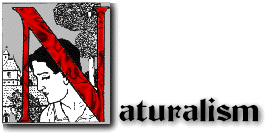
..... In literature, the theory that literary composition should be based on an objective, empirical presentation of human beings.
It differs from realism in adding an amoral attitude to the objective presentation of life. Naturalistic writers regard human behavior as controlled by instinct, emotion, or social and economic conditions, and reject free will, adopting instead, in large measure, the biological determinism of Charles Darwin and the economic determinism of Karl Marx.
Naturalism was first prominently exhibited in the writings of 19th-century French authors, especially Edmond Louis Antoine de Goncourt, his brother Jules Alfred Huot de Goncourt, and Émile Zola. The latter, inspired by his readings in history and medicine, attempted to apply methods of scientific observation to the depiction of pathological human character, notably in his series of novels devoted to several generations of one French family. His essay "The Experimental Novel" (1880; trans. 1893) explains his theory of literary naturalism.
One of the first American exponents of naturalism was Frank Norris, whose novel McTeague (1899) is a classic study of the interplay between instinctual drives and environmental conditions. Other notable writers of naturalistic fiction were Sherwood Anderson, John Dos Passos, Theodore Dreiser, and James T. Farrell.
![]()